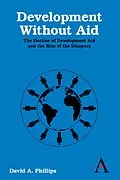?Development Without Aid? opens up perspectives about foreign aid to the world's poorest countries. Growing up in Malawi the author developed a sense of the limitations of foreign assistance and from this evolves a critique of foreign aid as an alien resource unable to provide the dynamism that could propel the poorest countries out of poverty.
The book aims to help move the discussion beyond foreign aid. It examines the rapid growth of the world's diasporas as a quasi-indigenous resource of increasing strength in terms of both financial and human capital, and considers how far such a resource might supersede aid. It uses extensive research findings to explore the possibilities for a resumption of sovereignty by poor states, especially in Africa, over their own development with the assistance of the world's diasporas.
Autorentext
David A. Phillips is a writer and economic consultant. He was educated in Britain and has a PhD in economic development.
Klappentext
"Development Without Aid” opens up perspectives and analyzes facts about foreign aid to the poorest developing countries. The discussion is advocacy as much as analysis, and makes extensive reference to recent research, including the author's previous work on the World Bank.
Starting from a perception about development formed during the author's formative years in what is now Malawi, the book develops a critique of foreign aid as an alien resource inherently unable to provide the necessary dynamism to propel the poorest countries out of poverty, and compromised by profound anomalies which subvert its own effectiveness. The book aims to help move the perception of development in poor countries squarely beyond foreign aid and beyond the discussion of its role, architecture and design, and to re-assert an indigenous development path out of poverty.
To move beyond foreign aid, the book examines a new international dynamic, i.e., the rapid growth of the world's diasporas as a quasi-indigenous resource of increasing strength in terms of both financial and human capital. It considers the extent to which such resources might be able to replace the apparatus of foreign aid and help move towards a reassertion of sovereignty by poor states, especially in Africa, over their own development process.
Inhalt
List of Acronyms; Acknowledgments; 1. Introduction: Motivation and Perspective; 2. What Is Foreign Aid, Who Does It, Why and How Much Is There?; 3. How Far Has Development Aid Been Effective?; 4. Why Has Development Aid Done So Little?; 5. Changing the Dynamics of Development; 6. "New Aid”: New Ways to Promote and Finance Development?; 7. Another Pathway Out of Poverty?; 8. Exit Strategy - Replacing Foreign Assistance; 9. Postscript; Notes; Index
